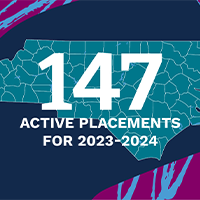by Chris Hilburn-Trenkle
Daniela Marciano was sitting at her desk repeatedly refreshing her email when she received the news in late October. She immediately ran into the next room to celebrate with her partner.
Tim Fletcher was in the middle of a workday at Family Medicine & Rehabilitation Centers when he saw the email he was hoping to receive pop up in his inbox. He and his wife, who also works at the clinic, excitedly opened the message together.
Marciano and Fletcher are two of the 44 students who make up the first cohort of the Online Master’s of Social Work program at the University of North Carolina at Chapel Hill School of Social Work. Though the two students arrived through different paths — Marciano works in the corporate structure and Fletcher works at a clinic on the coast in eastern North Carolina’s Morehead City — they were both driven to the program by the flexibility it afforded them in their day-to-day lives, allowing them to continue working and supporting their loved ones while chasing their passion.
“There’s so many reasons why this online program is fantastic but having the option to continue to support my partner and I, our tiny little family, and be able to pursue something that I’ve wanted to do for a couple years now, I feel so grateful for the opportunity …” Marciano said.
Establishing the online program
The process to create an online master’s of social work program started nearly a decade ago, but the plan became solidified in a fifth-floor classroom of the Tate-Turner-Kuralt Building during the summer of 2022.
For some time, members of the School were focusing on areas of growth through the lens of the communities the School served, increasing the workforce — especially in areas of the state where there were a limited number of mental health practitioners and social workers — and expanding the impact and reach of the program. After seeing a significant amount of interest for an online program, the groundwork began.
After some deliberation, faculty members agreed to establish three cohorts for the two-year online program — beginning in August, January and April, respectively. The first year requires 29 credit hours and includes 400 hours at a supervised practicum practice, and the second year requires 33 credit hours, with 600 hours of supervised practice in the student’s preferred area of concentration — either community, management, and policy practice or direct practice.
From there, various subcommittees were formed for evaluating applicants, constructing an admissions committee, receiving approval from the UNC System and the accrediting board for social work schools to launch the program, planning how to market the new program, and hiring an assistant director of admissions to oversee the online program, among other factors.
The School’s initial goal was to welcome 30 students into its first cohort, but as the number of qualified applicants quickly grew in the fall of 2023, a decision was made to expand the number to 44 students for the January 2024 cohort.
“It excites me, it makes me very proud [to see such interest], it makes me very proud that this is a program that many have selected an interest in wanting to come to, that people were waiting for this, and it seemed like just a great opportunity and at the right time,” said Sharon Thomas, assistant dean for recruitment, admissions and financial aid.
Deciding to apply
As a student at the University of Maryland, Marciano worked as a resident assistant for more than two years. It was there that her passion for social work grew. She dealt with cases involving sexual assault, domestic abuse and mental health crises, and while she noted the work was exhausting, she said it was also extremely gratifying for her.
Post-graduation, Marciano worked in various corporate jobs. She found herself asking questions about the human experience and wanting to pursue her passion to help others and reduce suffering, just as her therapist had helped to improve her own quality of life. Once she saw that the School of Social Work was receiving applications for a new online MSW program, she applied in September 2023.
Fletcher was working with a local Hispanic organization in Morehead City when he received what he felt was his sign to pursue an MSW degree. Members of the association shared with him the need for a social work counselor who spoke Spanish in Carteret County. As a citizen of Carteret County who is fluent in Spanish and previously lived in the Dominican Republic and Colombia, Fletcher felt this was the opportunity he was looking for.
Later, while at a hospital in December 2023, Fletcher spoke with a nurse whose 15-year-old son had been recently diagnosed with Type I diabetes. After Fletcher graduated from medical school in 2001, he was unable to complete his licensing exams because his own son was diagnosed with Type 1 diabetes at age 11. Fletcher wondered why there weren’t enough counselors to help families with children dealing with chronic illnesses. He told the nurse about his own son, who now works at the United States Department of the Navy, and let her know everything was going to be okay.
“She started crying and was like, ‘That’s what I needed to hear,’” Fletcher said, explaining that her response solidified his decision to pursue an MSW degree as a counselor for families with children who have chronic illnesses.
A day in the life of the program
Marciano works from 9-to-5 as a content delivery lead at Heinemann Publishing, but she makes time to finish her class assignments early in the morning, when she gets home from work, and on the weekends. Due to her busy schedule, she’s unable to meet with professors during standard office hours, but she said they’ve always made sure to accommodate her and her schedule.
Fletcher echoed that sentiment, noting the encouragement he’s received from professors during his short time in the program.
“…There were times where I was writing a discussion paper, or a paragraph or something, or a 300-word type thing on Canvas and I mentioned, ‘I’ve had my doubts about whether I was supposed to be here,’” Fletcher said. “Because my vast background is as a physician and I think I made the offhanded comment to that, and when she graded the assignment, she gave me positive feedback, but she said, ‘I definitely think you’re supposed to be here.’ I didn’t even have that kind of interaction with my professors in med school, so it felt personalized.”
Fletcher prints out his reading assignments from his textbooks, and throughout his shift he’ll find time to read and take notes. During his lunch break he logs onto the program portal and goes through his assignment modules. After the patients leave the clinic for the day, he works on classwork for an hour or so, then goes home to continue studying.
“It’s definitely doable. If I can swing it, if I can do it, then anybody can do it,” Fletcher said. “Once you just learn to prioritize the school part and how you’re going to do it with your busy schedule. Once you get in that comfort zone it becomes easier.”
Looking forward
The online program will welcome its second cohort of students for the summer program starting in late April. Thomas stated that the admission team’s goal is to accept 30 students in that cohort, along with 30 students for the fall cohort beginning in August.
The School is already looking at ways to enhance and improve the program moving forward, such as possibly providing certification programs. Program leaders are continually ensuring that applicants have all the information they need to determine whether Carolina is a proper fit.
Students in the first cohort have helped build on that foundation for the program by providing detailed feedback as they navigate through their first semester.
“A lot of the feedback has been very positive, that they’re enjoying the courses, enjoying the camaraderie amongst the cohort, which I think is great,” Thomas said. “I think when you have that size of the program you really do have the opportunity in an online space to get to know them a bit better versus being enrolled with 100 to 300 people in one class. I think they have been excited to meet one another and connect and I think [they’re] excited about the material.”
That connection has allowed students from all different backgrounds, ranging from stay-at-home parents to corporate employees to working social workers and attorneys, to feel at home in the program after only a few short months.
“I think the UNC program as a whole is fantastic, but being in this program with such a diverse cohort is going to equip me to be the best possible therapist that I can be,” Marciano said.
Related Stories

UNC School of Social Work ranked fourth in national research expenditures
University of North Carolina at Chapel Hill School of Social Work researchers helped the school secure a top four placement in the latest NSF HERD Survey.

School Of Social Work celebrates expansion of practicum education
Over the past 34 years, as the School of Social Work has created a bigger footprint and seen its influence and ability to help others around the state grow, practicum education has evolved with it.

